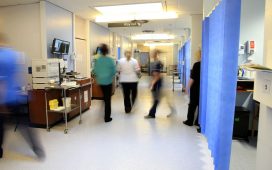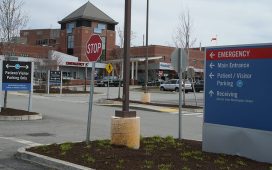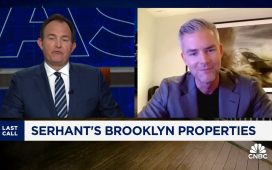Almost 8,000 people were harmed and 112 died last year as a direct result of enduring long waits for an ambulance or surgery, prompting warnings that NHS care delays are “a disaster”.
The fatalities included a man who died of a cardiac arrest after waiting 18 minutes for his 999 call to be answered by the ambulance service and was dead by the time the crew arrived.
The figures are the first time NHS England has disclosed how often doctors and nurses file a patient safety report after someone suffers harm while waiting for help.
They show that patient deaths arising directly from care delays have risen more than fivefold over the last three years, from 21 in 2019 to 112 last year, as the NHS has come under huge strain. The number of people who came to “severe harm” has also jumped from 96 to 152 during that period.
The overall number of people suffering some degree of harm in such circumstances has leapt from 3,979 in 2019 to 7,856 in 2022, a rise of 97%.
“These data are alarming and show quite clearly the human impact the crisis in the NHS is having on individual patients,” said Rachel Power, the chief executive of the Patients Association. “We have been watching a disaster unfolding across the NHS and have repeatedly warned about the threat to patient safety because of it.”
Trusts are reducing the amount of planned surgery they perform after the government’s refusal to provide a £1bn bailout to help cover the cost of staff strikes. Power said this would “translate into even more patients waiting for care and potentially coming to harm”.
A total of 471 patients waiting for adult mental health care suffered harm as a result of delays last year, more than in any other specialism – though this may be down to higher patient numbers. The next highest numbers were in care involving childbirth with 253, eye problems 221 and trauma and general surgery 207.
NHS England gave the Guardian anonymous details of 30 of last year’s deaths. One entry explained: “Long delay in call answer on critical call. Original call into [an unnamed ambulance service] 18 minutes prior to first related call answered. Call coded as cardiac arrest once answered and patient deceased on scene.”
Someone suffering a cardiac arrest is meant to be attended by an ambulance crew within seven minutes of the call being made, because their life is at risk. Several other deaths involved ambulance services “stacking” 999 calls, in which people are left on hold because they do not have the resources to answer them quickly.
In another case, a patient who was starting chemotherapy for follicular lymphoma was also diagnosed with hepatitis B. They were initially treated but were then not seen in the hepatitis clinic and did not receive a further dose of a drug called tenofovir. The patient then developed fulminant hepatitis B and died.
The figures are taken from the NHS’s national reporting and learning system (NRLS), a database in which staff make an entry if they believe that a patient has had poor care.
The Guardian obtained the statistics through a freedom of information (FoI) request to NHS England, which only released the data after the information commissioner intervened. It should have released the figures after a month, but took five to do so.
Healthwatch, the statutory patient champion, said patients facing long delays for care can feel forgotten.
“We know that delays to care have significant impacts on people’s lives, putting many in danger. People told us about being removed from waiting lists, sometimes without being told why, or without being told at all,” said Louise Ansari, the watchdog’s chief executive.
Paul Whiteing, the chief executive of Action against Medical Accidents, a patient safety charity, said: “The significant increase in these reported incidents of patient harm and death are shocking … Sadly they accord with what we are hearing daily from patients who contact us to tell us of their harrowing problems.”
after newsletter promotion
Adam Sampson, the chief executive of the Association of Optometrists, said: “We’re facing a health emergency where more people than ever are waiting longer than ever for sight-saving treatment.
“It’s incomprehensible and absolutely tragic that patients are experiencing delays to such an extent that they suffer further sight loss that is both avoidable and irreversible.”
NHS England’s figures are almost certainly a significant underestimate of the problem. A&E doctors have estimated that as many as 500 people a week may be dying because of delays in getting an ambulance, receiving A&E care or starting specialist treatment.
Ambulance service bosses calculated that 6,000 people were exposed to “severe harm” in December 2022 alone, and the British Heart Foundation previously warned of the threat to life delays pose.
A health service spokesperson said: “NHS staff worked extremely hard to keep patients safe during one of the busiest winters on record last year, and while delays linked to serious harm are rare, when they do happen, trusts are required to investigate them and understand what has happened so they can take effective steps to further improve.
“To meet the continued record demand the NHS has prepared earlier than ever before for this winter, rolling out 800 new ambulances and 10,000 virtual ward beds, while waiting times for ambulances, 999 calls and in A&E have improved across the country during this financial year.”
Some heart attack and stroke patients are waiting more than 90 minutes for an ambulance to arrive, an analysis by the Liberal Democrats of NHS data has found. Such calls should be answered in 18 minutes because of the risk to life involved.
“We know that a matter of minutes can make all the difference in emergencies. So it is heartbreaking to see ambulance delays are worsening and heart attack and stroke victims being left waiting hours for help to arrive”, said Daisy Cooper, the party’s health spokesperson.












